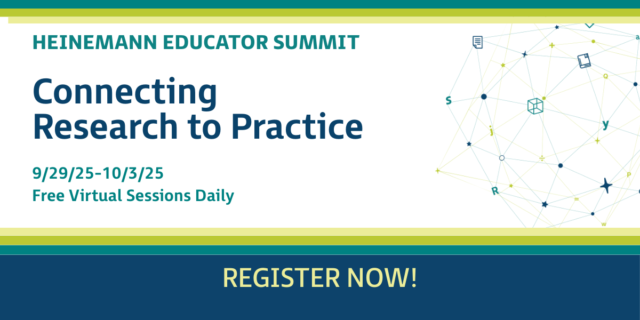Sascha Robinett is a Heinemann Fellow with the 2014–2016 class, and has been an educator for 19 years. In today's post, Sascha discusses the importance of teacher agency from the administrator's perspective.
Sascha Robinett is a Heinemann Fellow with the 2014–2016 class, and has been an educator for 19 years. In today's post, Sascha discusses the importance of teacher agency from the administrator's perspective.

by Sascha Robinett
February is a typical slump month for my staff: they are tired, stressed, and insecure about their impact on the students. To me, they are heroes—ordinary people doing something extraordinary. What is a principal to do? I’m having them make superhero capes, of course! They move about the room, gluing, laughing, and talking about their superpowers: their unwavering belief in every child’s potential, the ability to help kids accomplish more than they thought was possible.
Everyone needs to be reminded that she or he matters. A teacher’s sense of agency cannot be taken for granted. In my own early teaching experience and, later, as I consulted with schools across the country, I encountered many schools that did not support teacher agency. Teachers were working hard (were probably overworked) but were isolated in their own room. Professional development consisted of meetings or training, joy was rarely evident, and teachers were seldom asked to create or share their thinking. Success was determined by compliance and test scores.
However, I also found schools that trusted their teachers. As a result, the students and teachers excelled. Collaboration and reflection replaced sit-and-get learning, curiosity and inquiry reigned, and enjoyment was evident. These successful schools had one thing in common: the teachers knew they mattered.
Eleven years ago I was given the amazing opportunity and tremendous responsibility of opening Milagro Charter School, a small elementary school in northeast Los Angeles. My goal was to create a space where everyone—teachers, students, and parents—is encouraged to think and create, and risk-taking and innovation are taken for granted. My only condition is that teachers and support staff explain why they want to try something new, not for compliance, but to show intent. It’s okay if the idea doesn’t work out: mistakes are opportunities to improve and learn. We honor teachers’ self-reflections as a tool for growth, and we make it a part of all our professional development. We also rely on collaboration; although each teacher is alone in her classroom, she is always connected to the larger school community. Every week the staff engages in some form of collaborative sharing and discussion, from planning a lesson to learning a new math strategy. We depend on collective wisdom and support.
The opportunity to create a culture in which all members feel they matter and have impact is worth the effort.
For me, this school is a professional utopia: our teachers’ dedication is infectious; we consistently meet our performance goals; and our students blossom socially, emotionally, and academically. Of course, this environment was not created overnight, nor has it been an easy task. We’ve made mistakes, and we still have much to learn. In today’s culture of blame and accountability in education, our success is often dismissed as an anomaly, and we are constantly pressured to explain why our approach works. It is exhausting, overwhelming, and lonely at times. But having the opportunity and ability to create a culture in which all members feel they matter and have impact is worth the effort.
As a Heinemann fellow, I am focusing my research on one of the major stumbling blocks our school has encountered in its mission to be people-centered: teacher evaluations. This year, we are attempting a new system of evaluation in which the teachers create their own action research project rather than undergo a traditional performance evaluation that results in little growth, lots of tears, and low morale. I believe teachers will have a deeper impact on student learning when their evaluations are based on a change they’d like to see in their students rather than on classroom observations and standardized test scores. So far, our teachers have determined the student growth they want to create and begun planning how they will facilitate the change and collect data.
This isn’t an easy project. Being a principal and a coach simultaneously is a delicate balancing act. Having the time and space to analyze just one issue is a luxury, but it’s also a challenge. And the pressure to meet accountability requirements is always a concern. However, my teachers matter, and I want them to know it. Their sense of agency is worth this effort. As we’ve learned in creating Milagro, staying with what we already know doesn’t bring about the change we need.
♦ ♦ ♦ ♦
Sascha Robinett is a principal and co-founder at Milagro Charter School in Los Angeles, CA. Her action research focuses on the efficacy of engaging teachers in action research versus traditional performance evaluation processes.
Please visit the Heinemann Fellows page to learn more.


